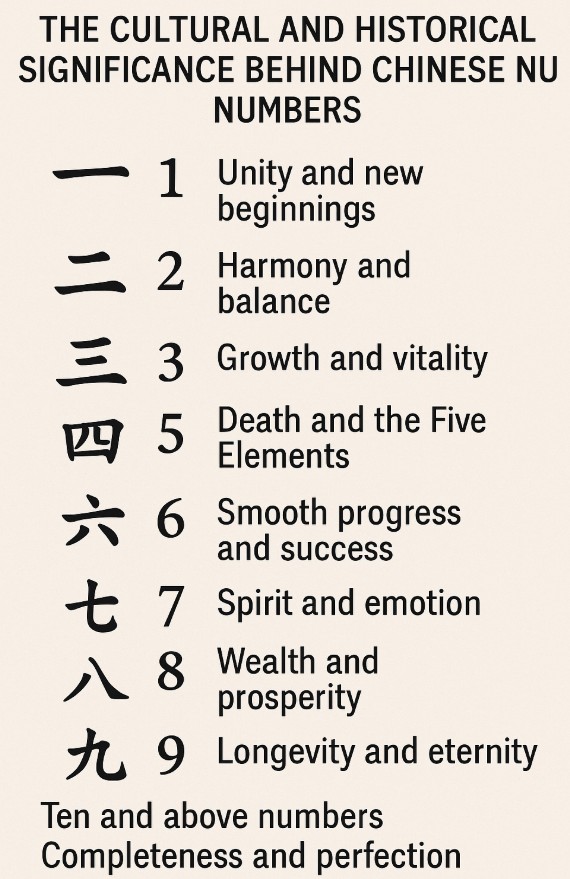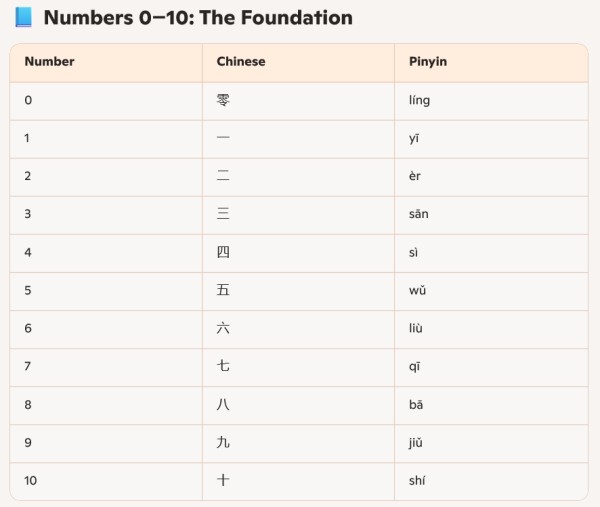The Cultural and Historical Significance Behind Chinese Numbers
Numbers in every culture are more than just mathematical symbols—they often carry deep cultural meanings and emotional associations. In Chinese culture, numbers are especially significant. Rooted in thousands of years of history, philosophy, and linguistic playfulness, Chinese numbers influence everything from business decisions to personal life events like weddings and funerals. Let’s explore the cultural and historical meanings behind these seemingly simple digits.

1. 一 (Yī) — Unity and New Beginnings
The number one symbolizes a beginning, leadership, and uniqueness. It often stands for unity or the origin of all things, echoing Taoist beliefs about the universe's beginning. In traditional Chinese philosophy, everything starts from one, aligning with the concept of "道生一 (Dao gives birth to One)."
2. 二 (Èr) — Harmony and Balance
The number two is associated with harmony and balance. A common Chinese saying is "好事成双 (Good things come in pairs)." In traditional weddings, decorations and gifts often come in pairs, reflecting the belief that double is better.
3. 三 (Sān) — Growth and Vitality
Three represents life and development. It is linked with the concept of the "three realms" (heaven, earth, and mankind) in Chinese cosmology. It’s also considered lucky due to its positive pronunciation and association with natural progression.
4. 四 (Sì) — Death and Misfortune
Perhaps the most infamous number, four is widely avoided in Chinese culture because its pronunciation is similar to the word "死 (sǐ)," which means death. Buildings may skip the 4th floor, license plates and phone numbers often exclude it, and gifts in sets of four are considered highly inauspicious.
5. 五 (Wǔ) — The Five Elements and Power
The number five is deeply rooted in Chinese philosophy, representing the "Five Elements" (wood, fire, earth, metal, and water) that constitute the universe. It also appears in many traditional concepts such as the Five Blessings (longevity, wealth, health, virtue, and peaceful death).
6. 六 (Liù) — Smooth Progress and Success
Six sounds like "流 (liú)" which means to flow. It symbolizes things going smoothly and is often used in business names, car license plates, or celebratory messages like “六六大顺 (Everything goes smoothly).”
7. 七 (Qī) — Spirit and Emotion
Seven carries mixed connotations. In Taoism and Buddhism, it is a spiritual number. However, it is also associated with mourning—traditionally, the seventh day after a person's death is when their spirit returns home. Despite this, it’s also commonly linked to love, as Chinese Valentine’s Day falls on the 7th day of the 7th lunar month.
8. 八 (Bā) — Wealth and Prosperity
Probably the most favored number, eight is highly auspicious because it sounds like "发 (fā)" which means to prosper or to make a fortune. The number 8 is so highly prized that people pay premiums for phone numbers, license plates, and addresses containing it. The Beijing Olympics, for example, began on 8/8/2008 at 8:08:08 PM.
9. 九 (Jiǔ) — Longevity and Eternity
Nine is associated with longevity and eternity, as it sounds like "久 (jiǔ)," meaning long-lasting. Historically, it symbolized the emperor: the Forbidden City in Beijing is said to have 9,999 rooms, close to the mythical "10,000 rooms of heaven."
The Number 10 and Beyond
Ten (十, shí) symbolizes completeness and perfection. In modern culture, combinations of numbers—like 520 (wǔ èr líng)—have become internet slang for “I love you,” based on phonetic similarity. This reflects the continuous evolution of numerology in Chinese pop culture.
Understanding the meanings behind Chinese numbers offers more than just insight into language—it reveals a worldview where numbers interact with nature, society, and the cosmos. Whether it’s for luck, love, or tradition, numbers play a powerful role in the daily lives and decisions of Chinese people. So next time you see a phone number full of 8s or a building missing a 4th floor, you’ll know there’s more than superstition at play—there’s history, culture, and a deep respect for symbolic meaning.
Website: The Cultural and Historical Significance Behind Chinese Numbers https://platogame.com/news/view/6
Related Content
How to Learn Chinese NumbersHow to Learn Chinese Through Scratch Programming
Learning Some Basic Chinese Through Scratch
How to Learn Chinese Well Through Games
Chinese learning for kids through game
